Protecting Your Brain Health During the Pandemic
Our guide to working around the current challenges to cognitive fitness
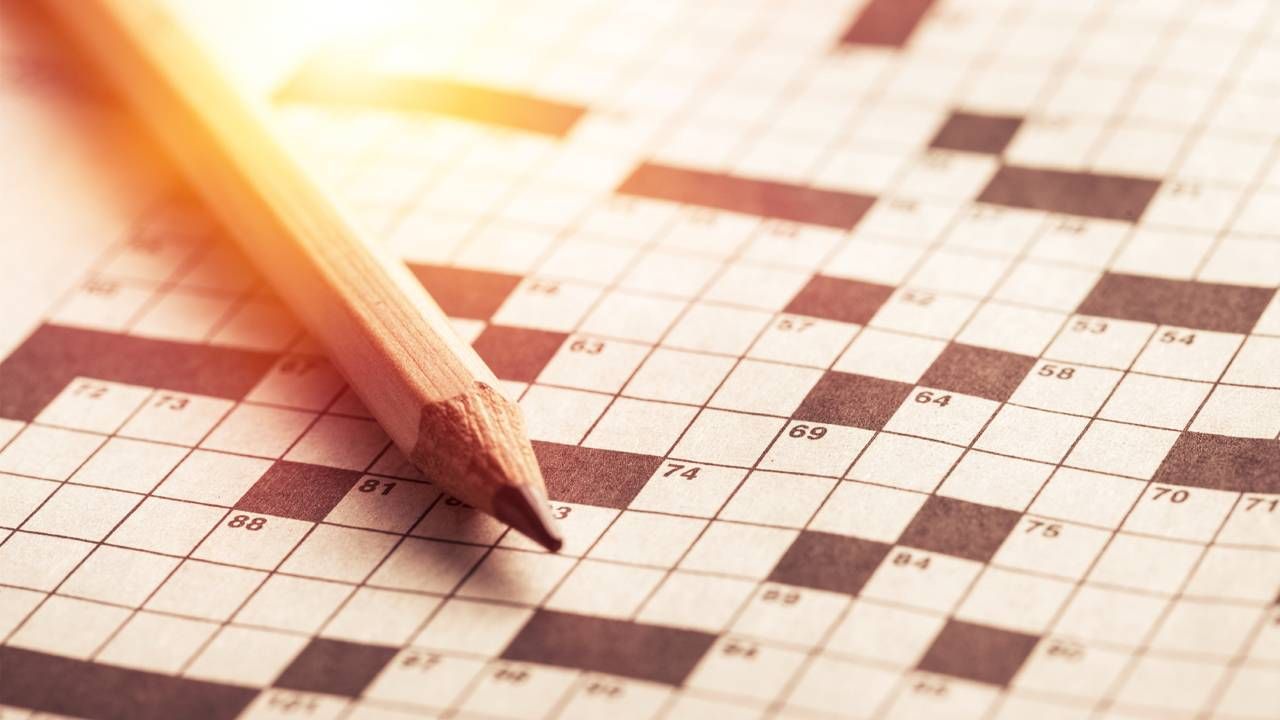
All those precautions you're taking to stay safe during the pandemic? Ironically, they might be putting your brain's health at risk.
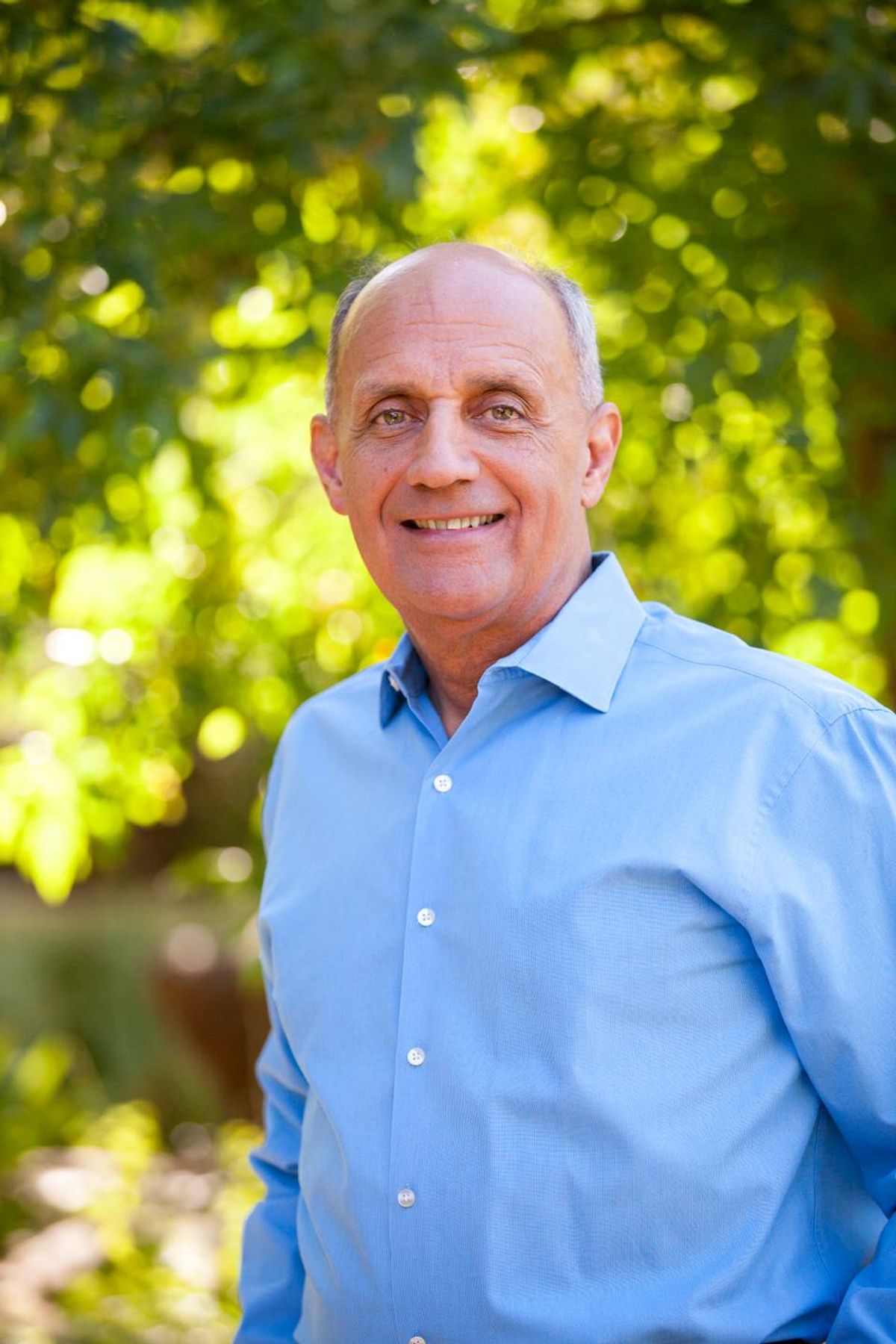
"Our heavy reliance on technology, not seeing family and grandkids, putting off doctor's appointments, not going to the gym and a lack of physical touch, of socializing, and of purpose – all lead to 'negative neuroplasticity,' the potential to accelerate the risk for cognitive decline," says former U.S. Surgeon General Dr. Richard Carmona, now distinguished professor of public health at Arizona State and the author of "30 Days to a Better Brain."
"Brain health is even more important now because so much is under threat," he says. The answer? Flip COVID-19's challenges to opportunities, says neuroscientist Sandra Bond Chapman, founder of the Center for BrainHealth at the University of Texas at Dallas. "For everything you do, ask, 'What is this adding to my life?' Are you doing crosswords just to pass the time and not be alone? Or are you doing different kinds of activities to stretch your mind and add meaning and purpose?"
Prioritizing brain self-care pays off in the long-term, she says. "And the brain's neuropharmacy changes — you get a dose of dopamine — just by telling yourself, 'I can do this; it can happen.'"
Brain Need: Mental Challenges
Hurdle: Less Travel, Arts Outings, Meetings
"We need to be even more deliberate and planful now," says Cynthia Green, president of Total Brain Health (TBH), a wellness programming provider. That means looking for ways to "level up" — increasing the degree of challenge in your activities — as well as "mix it up" in terms of different types of mental engagement.
Make a conscious effort to reframe negatives in a more positive light.
She suggests making a pandemic bucket list; alas, there's still plenty of time. What do you want to do within the current limits? What skills could you develop? (Brush up on social media and other tech basics at Senior Planet.) What remote classes could you take? (See these Next Avenue online learning ideas.)
Did you join the COVID-19 jigsaw craze? Though these puzzles are cognitively beneficial, it's important to vary the types of thinking skills that you engage. Try the free Brain Performance Challenge app from the Center for BrainHealth, which measures your strategy, reasoning and innovation skills.
Do you do a daily crossword? Branch from word to number brainteasers. AARP's Staying Sharp (free to members, $35.99/year to nonmembers) is an entire site of daily puzzles, games, and more.
Addicted to romance novels? Switch to nonfiction. Or try the Academy of American Poet's Poem-a-Day. Switching up literary styles (or listening to an audiobook for a change) engages different kinds of thinking skills.
Two ideas from Green's company:
- TBH on Demand: New, free 15-20-minute brain-training lessons (video or audio, with downloadable worksheets) that teach skills for better memory, attention, processing speed and more.
- TBH Toolbox 365 is a brain-based game featuring activity cards ($39.95). “We’ve had families play over Zoom, or send to a family member they can’t visit, to do with a caregiver,” she says.
Her favorite activity: Silver Linings. Make a conscious effort to reframe negatives in a more positive light; it actually boosts the feeling of happiness, research shows. What could be the silver lining in your favorite shirt ruined in the wash? Of a canceled visit?
"For my parent's sixtieth anniversary, we couldn't travel, so we created a Zoom birthday call, inviting thirty people who'd never have been with them otherwise," Green says.
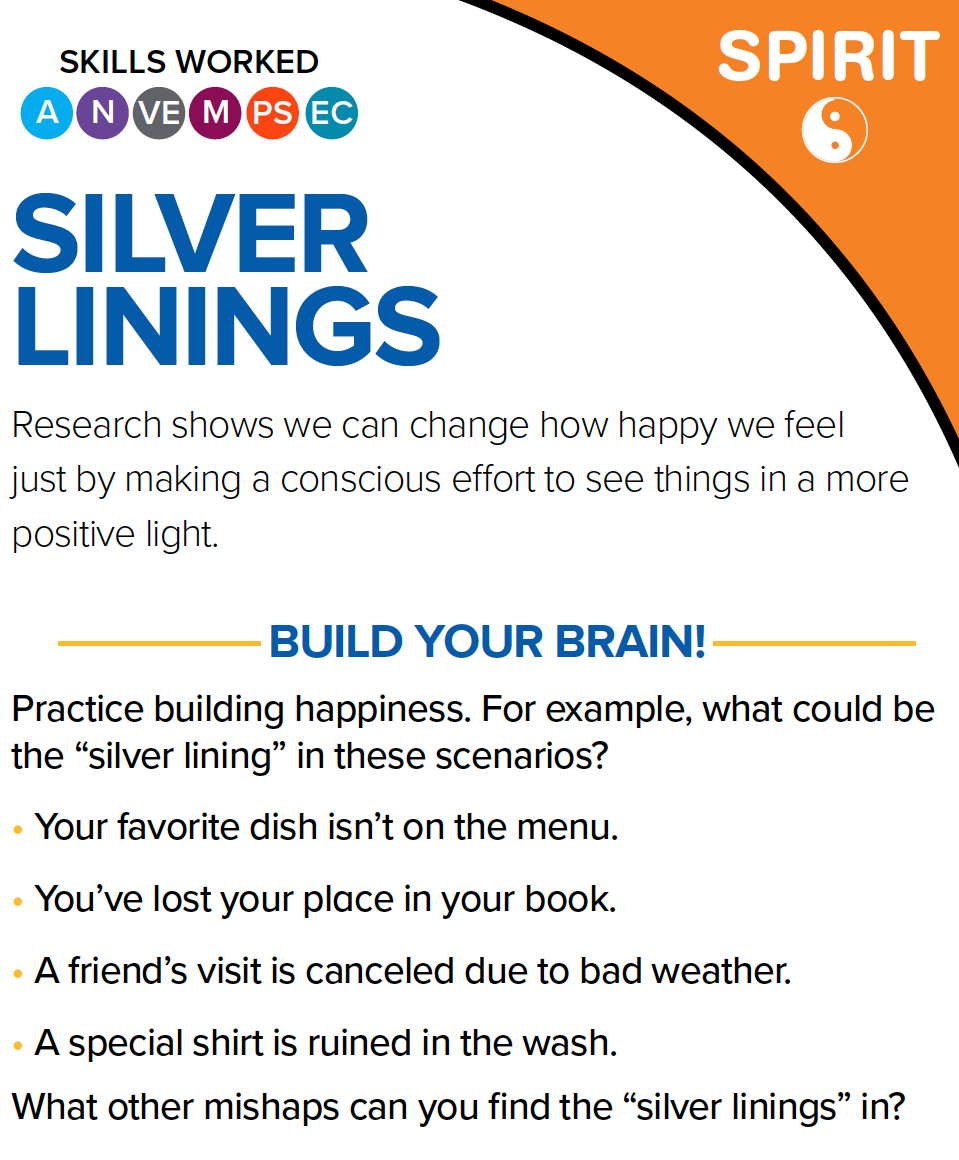
Brain Need: Novelty
Hurdle: Every Day Is So Much Like the Last
"Actively seek out things you did by habit as places where you can be more focused about trying to maintain brain health," says Sarah Lock, executive director of the Global Council on Brain Health (GCBH).
Listen to new music, more music and your favorite music in new ways. Unfamiliar tunes best stimulate the brain, while favorites best improve mood, says a 2020 GCBH report on the unique cognitive benefits of music. "Older people tend not to listen to music as much as when they were younger, plus now we're driving less and not turning on the car radio," Lock says. Dust off your LPs and CDs or play songs off your phone. Bonus brain points for using apps that suggest new-to-you sounds, like Spotify Discover Weekly.
Participate in at least one small group. And watch those puppy videos.
Aim to innovate seven times a day. It's Chapman's favorite mental challenge. "Rather than be discouraged by negativity or things falling apart, say 'OK, how can I improv to make it different or new?' It could be anything from how you write a subject line [in email] or what you cook."
Learn a second language. Not only do you challenge the brain in ways that boost cognitive skills like attention, concentration and memory, but every lesson brings new challenges as you advance. Learn-from-home options abound. Try a classic program like Rosetta Stone or sample the free phone app Duolingo.
Nurture a new pet — or a winter herb garden. Dogs, especially, tick the boxes of providing new experiences, exercise, purpose and companionship, Lock says. Recent research finds they improved mental health during the UK's COVID-19 lockdown. (Birdwatching worked, too.)
"If you don't have a pet, the next best thing is a garden," Chapman says. "There's always something new to do or see."
Brain Need: Varied, Live Social Engagement
Hurdle: Social Distancing
Social connections increasingly look as cognitively protective as exercise, sleep and diet. Green suggests using the phrase "physical distancing" as a mental reminder to maintain safety but to keep interacting with people.
"FaceTime isn't as valuable as physical contact, but that mid-level of connectedness, where you can see someone smile, is better than not seeing them at all," Carmona says.
Instead of isolating 100% of the time, weigh the risks and benefits. The Gerontological Society of America developed COVID-19 Decision Aid, a series of questions to help you clarify whether to do an activity with others.
View less as more. Deeper connectedness with two or three people can be as enriching as the old parties of 10 or more. "You can be together if you follow rules," says Chapman, like keeping at a distance or forming a "quaranteam."
Participate in at least one small group. One of Green's friends started an online book group; if your favorite group hasn't moved to an online platform yet, initiate it.
Go ahead, talk politics. "One of the most cognitively challenging things you can do is to have a conversation with people you disagree with and try to find common ground," Chapman says. "You don't have to agree, but get to a place where you can appreciate and value their point of view." Check out the Better Conversations Starter Guide from On Being.
Brain Need: Digital Breaks
Hurdle: Screens Are Our Main Windows to the World
Too much time online is fatiguing for the brain, Chapman says. Her suggestions:
Take 5x5 breaks. Step back from all mental engagement (even offline) for five minutes, five times a day, Chapman suggests. Close your eyes and recharge your brain.
Surf the net more purposefully. The brain gravitates to the bad as a protective survival mechanism. And we know what kind of rabbit hole that can lead to these days. Be a more purposeful consumer of info: "Broaden your base of understanding by taking in info from just two sources: one familiar and one not," says Chapman.
Especially limit pandemic news. Surf headlines just twice a day, under half an hour, rather than "snacking" on them all day, she says. A new UC-Irvine study directly linked rising stress and depression (big brain risks) to COVID-19-related media consumption.
And yes to those puppy videos, Chapman adds, to counter the brain's negativity bias: "Anything pleasant!"
Brain Need: Strength and High-Intensity Interval Training
Hurdle: No More Gym
While yoga and walking are good for overall fitness, elevating your heart rate for short bursts helps preserve brain mass and blood flow, improving functions like working memory and attention. Adding muscle through resistance work is also key, to counter mass lost each year with age, affecting overall metabolism.
"Don't just give up because the gym is closed," Carmona says.
"This is a perfect time to take the brain seriously, in a good way, because we have more time."
Dedicate space for online workouts. Set up streaming from your device to your TV to better bring classes into your home. Most paid workouts offer free trials while Silver Sneakers LIVE is free to eligible 65+ers with certain Medicare Advantage plans. Free to all: the Y's YMCA360 geared to gentler programs.
Invest in some smaller exercise equipment. Carmona, who also leads health innovation at Canyon Ranch wellness resort, recommends stretch bands and dumbbells (available at places like Target) to build strength. Stationary bikes and treadmills have long wait times if you order one delivered to your home, but a jump rope is a great High-Intensity Interval Training (HIIT) tool; running in place or jumping jacks work, too.
Find a digital role model. Instagram is full of peer inspiration you can get to know from the comfort of home, like Joan MacDonald, 74, of Cobourg, Ontario, who began training at 70.
Just commit to doing a little more each day. If you walk, walk faster (or jog) for short intervals. See Next Avenue's ideas for exercising at home.
Brain Need: Deep Sleep
Hurdle: Anxiety, Worry, Boredom, Lack of Exercise
More reason to prioritize sleep: The recently-discovered glymphatic system, which removes "trash" in the brain like amyloid plaques, is linked to Alzheimer's. It works mainly during deep non-REM sleep.
Among the best ways to ensure this deep sleep: Vigorous exercise and simply getting enough total sleep. It's another incentive to quit doomscrolling after dinner.
See Next Avenue's suggestions for sleeping better during the pandemic.
Brain Need: Plant-based Diet
Hurdle: Comfort Food Calls and Shopping is Scary
The Mediterranean-DASH Intervention for Neurodegenerative Delay (MIND diet) may slow brain aging by as much as 7.5 years while decreasing Alzheimer's risk. It's heavy on plant foods, which can be harder to stock when you shop less often, and limits the kinds of treats that helped fuel the pandemic yeast shortage.
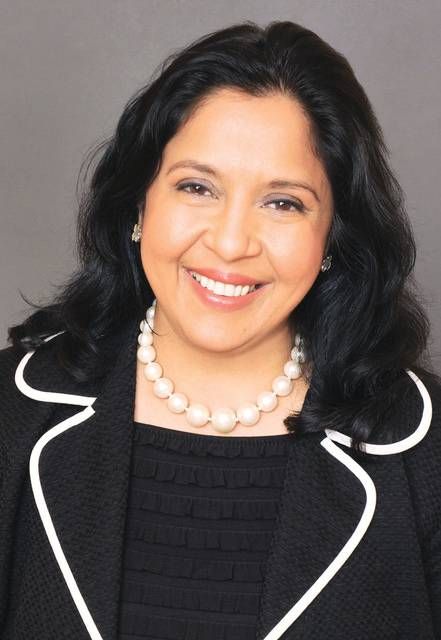
"Early on, baking became a coping mechanism; now it's time to reframe in a healthier way," says Harvard nutritional psychiatrist Dr. Uma Naidoo, author of "This Is Your Brain on Food." Her suggestions:
Order with forethought. Using a shopper you've written out means you don't get to handpick produce. But on the bright side, you can use it to avoid adding junk to your cart. "Sugar works in the brain similarly to cocaine," Naidoo notes.
Stock frozen produce to tide you over between grocery runs. Nutrients are comparable.
Create healthy swaps. Instead of baking cookies, roast spinach or kale for 20 minutes at a high temp, season with salt, paprika or garlic. Flavor water with fruit to replace juice or soda.
Feed the gut-brain axis. There's a direct connection, so foods that fuel the gut microbiome are good for brain health. Maybe you stocked up on beans and legumes in March? Perfect. Also think plain yogurt, sauerkraut, miso and nondairy yogurt with active cultures. Spice liberally — for thinking skills, use turmeric, saffron and rosemary (its aroma actually changes brain waves, Naidoo notes).
Brain Need: Avoid Anxiety and Depression
Hurdle: So Much to Be Anxious or Depressed About!

Poor mental health stresses brain health. While older adults tend to report more overall happiness, pandemic stressors like a sense of wasted waning time mean over half of adults report more negative mental health now.
"Feeling connected and finding a purpose is hugely helpful to brain health," Lock says. Look for projects you can join from home, she says. Or see VolunteerMatch's COVID-19 volunteering lists.
Try the Making Meaning tool developed at the University of Michigan, which uses an expressive writing exercise to offer immediate feedback on your emotional response to the pandemic.
Consider using this time to safeguard your cognitive health by diving deeper into the subject. The new Virtual Brain Health Center tries to tick all the boxes. Founded by Krystal Culler, a fellow of the Global Brain Health Institute, the site offers free virtual memory screenings and $5-$10 live virtual classes – a way to socialize while practicing mindfulness or tai chi, learning about topics like gratitude and fear, doing aerobics and more. Its thorough Resources page points you to many of the best brain-focused info out there.
For stress-relief ideas, like handwashing meditations by restorative yoga trainer Jillian Pransky and tools like circle breathing, see Total Brain Health's Quiet the Mind site.
Consider helping yourself while helping advance brain science. UT-Dallas's BrainHealth Project is an online study accepting applications to enroll 120,000 volunteers of all ages that will use game-like activities and e-learning modules to track the brain's ability to improve.
"People in the pilot study are saying, 'You've helped me to embrace the things I can do now and not resent so much the things that are gone,'" Chapman says.
She adds: "This is a perfect time to take the brain seriously, in a good way, because we have more time."
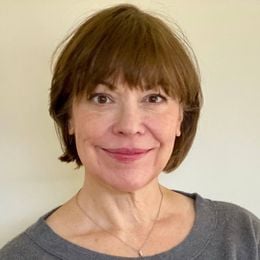
Read More

